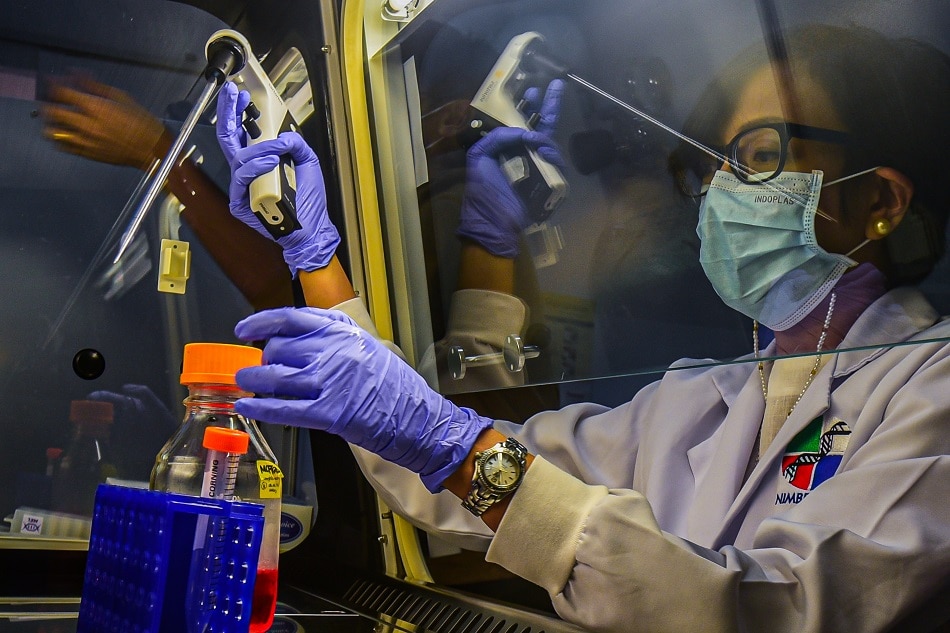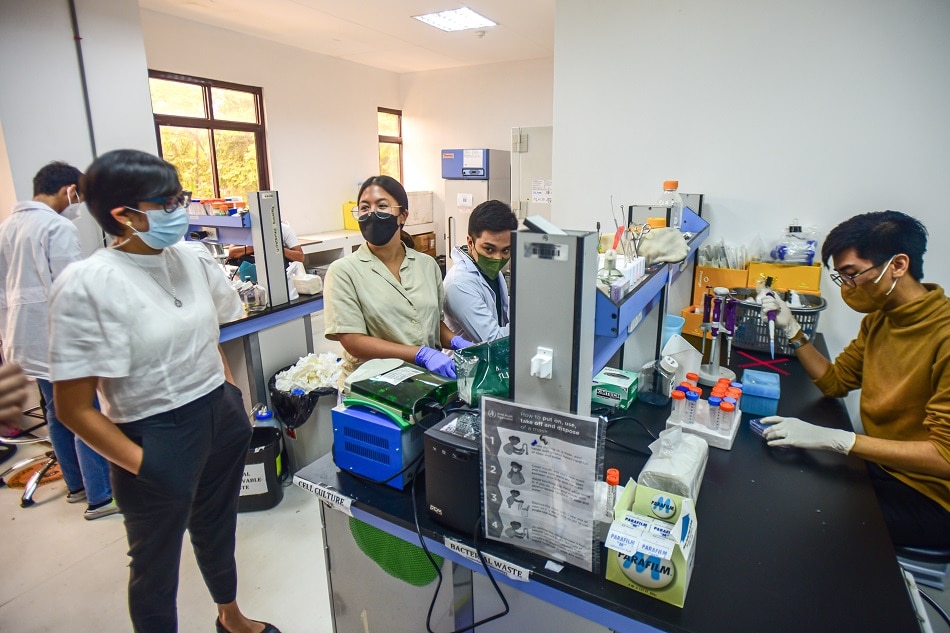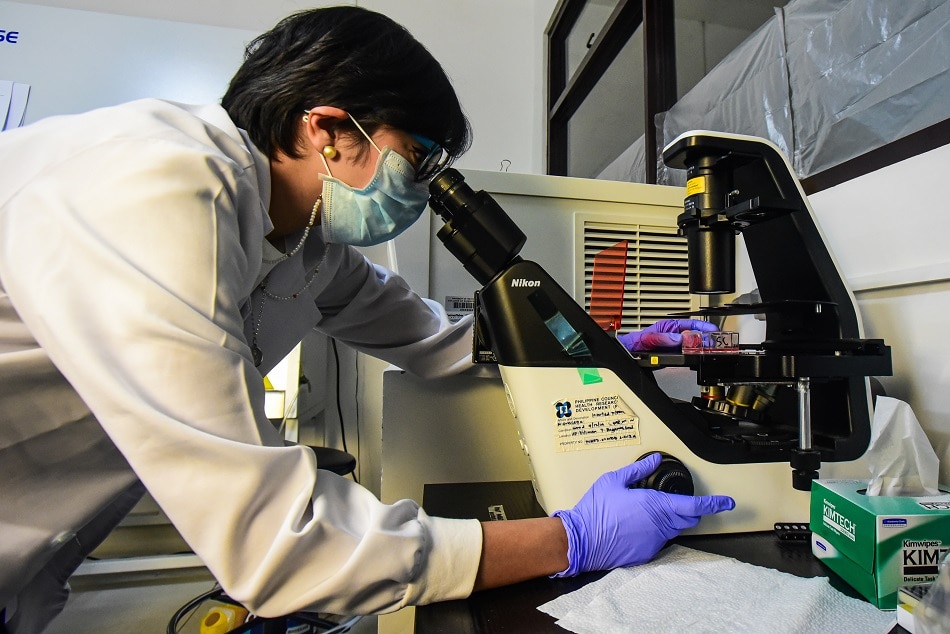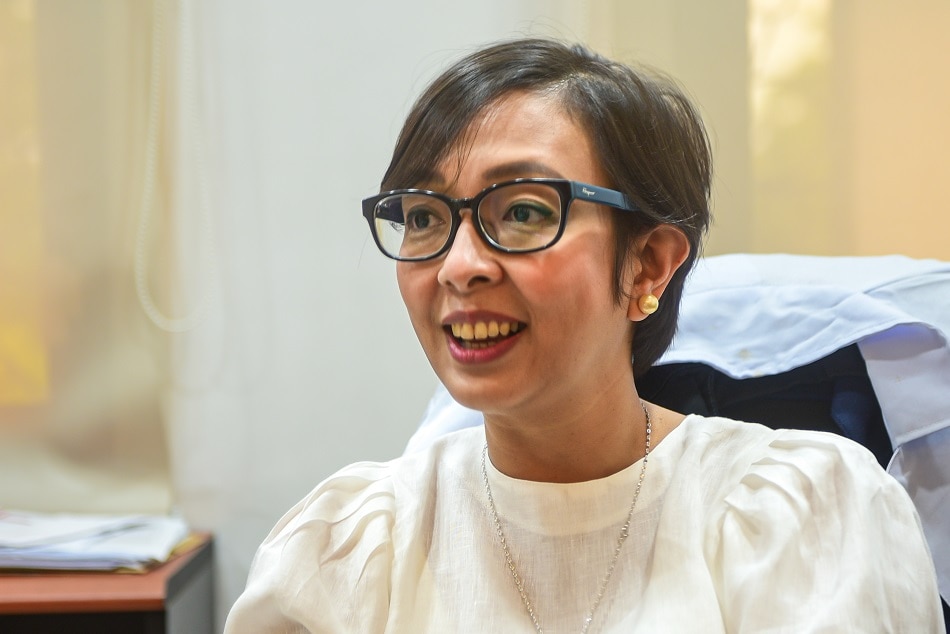Amazing Women: How Dr. Pia Bagamasbad helped fight COVID-19 in Philippines | ABS-CBN
ADVERTISEMENT

Welcome, Kapamilya! We use cookies to improve your browsing experience. Continuing to use this site means you agree to our use of cookies. Tell me more!
Amazing Women: How Dr. Pia Bagamasbad helped fight COVID-19 in Philippines
Amazing Women: How Dr. Pia Bagamasbad helped fight COVID-19 in Philippines
Davinci Maru,
ABS-CBN News
Published Mar 31, 2023 05:00 AM PHT
|
Updated Oct 29, 2024 06:56 AM PHT
MANILA — When the novel coronavirus broke out in the Philippines in early 2020, the country had its back to the wall, having only few laboratories capable of diagnosing COVID-19.
MANILA — When the novel coronavirus broke out in the Philippines in early 2020, the country had its back to the wall, having only few laboratories capable of diagnosing COVID-19.
The country was in a race against time as early detection was crucial to contain the spread of the virus.
The country was in a race against time as early detection was crucial to contain the spread of the virus.
While the world stood still, Dr. Pia Bagamasbad and her team from the National Institute of Molecular Biology and Biotechnology in the University of the Philippines Diliman had their work cut out for them.
While the world stood still, Dr. Pia Bagamasbad and her team from the National Institute of Molecular Biology and Biotechnology in the University of the Philippines Diliman had their work cut out for them.
To scale up the country's pandemic response, she trained thousands of medical technicians across the Philippines on RT-PCR testing for COVID-19.
To scale up the country's pandemic response, she trained thousands of medical technicians across the Philippines on RT-PCR testing for COVID-19.
ADVERTISEMENT
This led the country to rapidly increase its testing capacity.
This led the country to rapidly increase its testing capacity.
"At that time, that was a very critical step towards curbing the spread of the pandemic," she told ABS-CBN News in a recent interview.
"At that time, that was a very critical step towards curbing the spread of the pandemic," she told ABS-CBN News in a recent interview.
"It was important for us to test so that we could identify and isolate cases immediately... At that time, konti lang 'yung laboratories na may capability and technical expertise to run the test," she recalled.
"It was important for us to test so that we could identify and isolate cases immediately... At that time, konti lang 'yung laboratories na may capability and technical expertise to run the test," she recalled.
For her significant contribution in the fight against COVID-19, Bagamasbad was named one of The Outstanding Women in the Nation's Service in 2022.
For her significant contribution in the fight against COVID-19, Bagamasbad was named one of The Outstanding Women in the Nation's Service in 2022.
CAREER PATH LESS TAKEN
Conducting research and experiments has always piqued her interest so she took up the Bachelor of Science degree program in Molecular Biology and Biotechnology in UP.
Conducting research and experiments has always piqued her interest so she took up the Bachelor of Science degree program in Molecular Biology and Biotechnology in UP.
"It's not a very popular career path, I would say. Not a lot of kids would say, 'I want to become a scientist,'" Bagamasbad said. "It's always 'I want to become a doctor, a lawyer or an engineer.'"
"It's not a very popular career path, I would say. Not a lot of kids would say, 'I want to become a scientist,'" Bagamasbad said. "It's always 'I want to become a doctor, a lawyer or an engineer.'"
After graduating college, she went to med school upon the prodding of her parents, who were apprehensive of her unconventional career choice.
After graduating college, she went to med school upon the prodding of her parents, who were apprehensive of her unconventional career choice.
"I gave in. I was dependent on my parents. I went to UP Manila for one semester. Then I realized while I was there that it really wasn't for me," she said.
"I gave in. I was dependent on my parents. I went to UP Manila for one semester. Then I realized while I was there that it really wasn't for me," she said.
Bagamasbad moved to Boston to work as a research assistant during which she also completed her PhD in the University of Michigan in 2012.
Bagamasbad moved to Boston to work as a research assistant during which she also completed her PhD in the University of Michigan in 2012.
She returned to UP in 2014 as a professor. Everything she learned abroad, she applied there.
She returned to UP in 2014 as a professor. Everything she learned abroad, she applied there.
"They (students) received an international standard level of education. That's why when they graduate, they're very competitive and they're able to enter the PhD programs abroad as well," she said.
"They (students) received an international standard level of education. That's why when they graduate, they're very competitive and they're able to enter the PhD programs abroad as well," she said.
Bagamasbad took the helm of NIMBB in 2022.
Bagamasbad took the helm of NIMBB in 2022.
STUDIES ON BREAST, PROSTATE CANCER
In February, Bagamasbad and her student, Weand Ybañez, published a research paper in the journal Cancer Cell International, about a link they discovered among stress, irregular sleep and breast cancer.
In February, Bagamasbad and her student, Weand Ybañez, published a research paper in the journal Cancer Cell International, about a link they discovered among stress, irregular sleep and breast cancer.
Their findings are the first to provide evidence for KLF9, a tumor-suppressor gene, in the link between stress and irregular body clock towards breast cancer risk and progression.
Their findings are the first to provide evidence for KLF9, a tumor-suppressor gene, in the link between stress and irregular body clock towards breast cancer risk and progression.
The NIMBB research team noted that the body clock is controlled by the 12-hour light and dark cycle, which regulates several bodily functions such as the suppression of various hormones at particular times of the day.
The NIMBB research team noted that the body clock is controlled by the 12-hour light and dark cycle, which regulates several bodily functions such as the suppression of various hormones at particular times of the day.
"Circadian disruption is an emerging driver of breast cancer, with epidemiological studies linking shift work and chronic jet lag to increased breast cancer risk,” they noted in their research paper
"Circadian disruption is an emerging driver of breast cancer, with epidemiological studies linking shift work and chronic jet lag to increased breast cancer risk,” they noted in their research paper
"If we are to take it forward... it would be good to take the study on how it translates to actual patients, meaning 'yung mga shift workers," she told ABS-CBN News.
"If we are to take it forward... it would be good to take the study on how it translates to actual patients, meaning 'yung mga shift workers," she told ABS-CBN News.
Bagamasbad also has a drug discovery project for prostate cancer.
Bagamasbad also has a drug discovery project for prostate cancer.
"I'm just waiting for the funds to be given in 2024. Approved na 'yun ng DOST (Department of Science and Technology) for us to take it into preclinical studies," she said.
"I'm just waiting for the funds to be given in 2024. Approved na 'yun ng DOST (Department of Science and Technology) for us to take it into preclinical studies," she said.
PH URGED: INVEST MORE IN SCIENCE
Doing research in life sciences in the country remains very challenging, Bagamasbad said.
Doing research in life sciences in the country remains very challenging, Bagamasbad said.
That's why a good number of Filipino scientists choose to work abroad, she added.
That's why a good number of Filipino scientists choose to work abroad, she added.
Bagamasbad called on the government to invest more in science and research, and improve its procurement process.
Bagamasbad called on the government to invest more in science and research, and improve its procurement process.
"If they want STEM (science, technology, engineering, and mathematics) professionals to increase, we have to increase the funds for research and make it more attractive for our talents to actually stay," she said.
"If they want STEM (science, technology, engineering, and mathematics) professionals to increase, we have to increase the funds for research and make it more attractive for our talents to actually stay," she said.
"When we invest, it's not just ano ba 'yung na-produce mong gamot? Ano ba 'yung na-produce mong test kit? Ang dapat nilang tingnan, ano ba ang na-produce naming tao?"
"When we invest, it's not just ano ba 'yung na-produce mong gamot? Ano ba 'yung na-produce mong test kit? Ang dapat nilang tingnan, ano ba ang na-produce naming tao?"
"Na highly trained, na nag-stay dito and we need to get them to stay because if they don't stay, we lose the best and the brightest," she continued.
"Na highly trained, na nag-stay dito and we need to get them to stay because if they don't stay, we lose the best and the brightest," she continued.
Despite the challenges, Bagamasbad said women have become leaders in science and research in the country.
Despite the challenges, Bagamasbad said women have become leaders in science and research in the country.
"A Filipina scientist is someone who pushes on despite the many, many challenges that we face on a day-to-day basis," she said.
"A Filipina scientist is someone who pushes on despite the many, many challenges that we face on a day-to-day basis," she said.
RELATED VIDEO
This article is part of the Amazing Women series of ABS-CBN News this month of March, featuring stories of select women who are making a mark in their respective fields and advocacies. March is National Women's Month in the Philippines.
Read More:
Amazing Women
Dr. Pia Bagamasbad
scientist
National Institute of Molecular Biology and Biotechnology
NIMBB
University of the Philippines Diliman
UP
Women's Month
Women's Month 2023
International Women's Month
ADVERTISEMENT
ADVERTISEMENT






